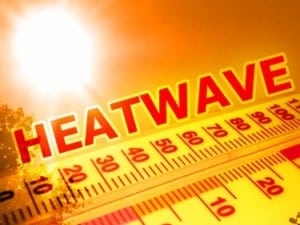
 During periods of extreme heat conditions, extra precaution should be taken to ensure the safety of older adults, infants and children, as well individuals who participate in outdoor activities or those who are sensitive to the heat. High temperatures mean an increased risk of heat exhaustion, heat cramps or sunstroke. Los Angeles County Extreme Heat Cool Centers are available during periods of extreme heat. Dial 211 on your phone, visit your local county 211 website, or visit www.sce.com/coolcenter to find a location near you. The Culver City Senior Center is a Cooling Center and is open from Noon to 4 pm on Saturdays and Sundays.
During periods of extreme heat conditions, extra precaution should be taken to ensure the safety of older adults, infants and children, as well individuals who participate in outdoor activities or those who are sensitive to the heat. High temperatures mean an increased risk of heat exhaustion, heat cramps or sunstroke. Los Angeles County Extreme Heat Cool Centers are available during periods of extreme heat. Dial 211 on your phone, visit your local county 211 website, or visit www.sce.com/coolcenter to find a location near you. The Culver City Senior Center is a Cooling Center and is open from Noon to 4 pm on Saturdays and Sundays.
Consider these tips from the L.A. County Department of Health to help you stay cool during a heat wave:
Tips to Beat the Heat
Drink plenty of water regularly and often, even if you do not feel thirsty. Do what you can to stay hydrated.
Stay indoors as much as possible and limit exposure to the sun. Consider spending the warmest part of the day in public buildings such as libraries, schools, movie theaters, shopping malls and other community facilities.
Check on family members, seniors, friends and neighbors and people with disabilities or those who may not have access to air conditioning and who spend much of their time alone.
Limit Your Exposure to the Sun
Avoid unnecessary sun exposure, wear a hat and use sunscreen.
Cover windows that receive morning or afternoon sun with drapes, shades, awnings or louvers.
Dress in loose-fitting, lightweight and light-colored clothes that cover as much skin as possible.
Avoid strenuous work during the warmest part of the day. Use a buddy system when working in extreme heat and take frequent breaks.
Infants and Children
Never leave children in closed vehicles. It is illegal to leave an infant or child unattended in a vehicle (California Vehicle Code Section 15620).
Infants and young children can get dehydrated very quickly. Make sure they are given plenty of cool water to drink.
Keep children indoors or shaded as much as possible and dress children in loose, lightweight, and light colored clothing.
Older Adults and Individuals with Chronic Medical Conditions
During peak heat hours stay in an air-conditioned area. If you do not have access to air conditioning in your home, visit public facilities such as cooling centers, shopping malls, parks, and libraries to stay cool.
Older adults and those on certain medications may not exhibit signs of dehydration until several hours after dehydration sets in. Stay hydrated by frequently drinking cool water.
Stay out of the sun if you do not need to be in it. While in the sun, wear loose-fitting, light-colored clothing with long sleeves and pants to protect against sun damage. Be sure to use sunscreen and sunglasses.
Pet Safety in Extreme Heat
Never leave a pet unattended in a vehicle, even with the windows ‘cracked’ or open.
Outdoor animals should be given plenty of shade and clean drinking water. Do not leave pets outside in the sun. Pets should not be left in a garage as garages can get very hot due to lack of ventilation and insulation.
If your pet spends time in the yard, make sure he or she has access to shade. Shaded trees, a covered patio or a cool spot under the porch can help keep your pet comfortable.


Be the first to comment